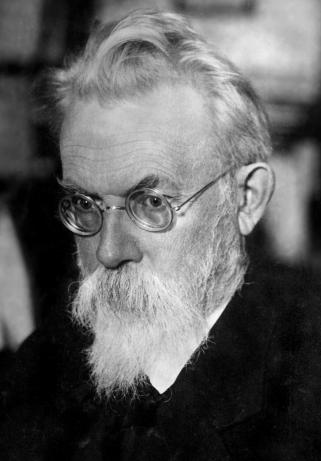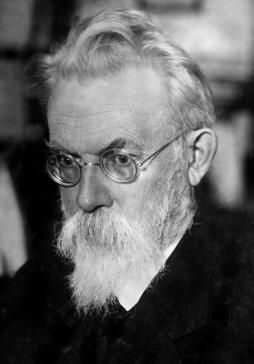By defining the “natural” and the “artificial” in terms of self-organized systems aiming to preserve a state of equilibrium, system theories and cybernetics offer an epistemological framework for understanding and assessing the effects of human activities on the planet, encouraging a transnational debate on anthropogenic change and sustainability. The theory of the Anthropocene emerged in the context of this debate, which, at the same time, set the ground for the development of the earth system science and the related International Geosphere-Biosphere Program.

From Life and work of Vladimir Ivanovich Vernadsky in the memoirs of his contemporaries (on the occasion of the 100th anniversary of his birth). Essays on the history of geological knowledge. Moscow: Publishing House of the USSR Academy of Sciences, 1963. Vol. 11. C. 7.
Routes to the Noosphere: Tracing Planetary Histories for the Anthropocene
Over the last five years, a plethora of volumes, articles, and essays focused on the Anthropocene have made evident a growing interest in this topic at the level of the academic community as well as within a more general audience. Despite this wealth of literature, however, current research on the Age of Humankind tends to be Western-centric, lacking inspiration from more various narratives and contexts that would indeed enable us to place this phenomenon in a real global, historical perspective. My project will approach the Anthropocene by following the still neglected path of the Russian and Soviet tradition in global ecology and earth-system theory from the end of the nineteenth until the late twentieth century. The development of a science of the biosphere in Russia is largely the result of a prominent intellectual tradition characterized by unique conceptions of the Earth, space, time, and planetary boundaries. This tradition made possible the development of a distinctive systemic approach to geology, ecology, and energetics that will pave the ground for further elaboration on the deep historical and planetary role of life on Earth.
This research is geared toward the accomplishment of a book that will be tentatively entitled Routes to the Noosphere: Tracing Planetary Histories for the Anthropocene. The first part explores the context in which the biosphere-noosphere theory was elaborated by the Russian mineralogist Vladimir I. Vernadsky during the first years of the twentieth century. The second part will deal with the noosphere legacy, exploring the various ways in which the noosphere—the term used by Vernadsky to introduce a new epoch in which the role of human science and technology becomes the most powerful planetary force—was understood and appropriated both in the Soviet Union and outside by geophysicists and global ecologists who studied and simulated the co-evolution between humanity and the biosphere, playing a crucial role in fostering international cooperation during the Cold War.
An analysis of the reception of Vernadsky’s noosphere in the West shows us that this has been recently understood as one of the closest antecedents to the Anthropocene notion. It is true instead that the noosphere bears a well-distinctive meaning that could only partially be associated with the Anthropocene. This interpretation has not only, to some extent, distorted Vernadsky’s original thought, but most importantly prevented current Anthropocene discussions from taking advantage of all the ideas and insights that Vernadsky’s work is still able to offer.
This project brings Russian and Soviet scientific and intellectual legacy on “planetary thinking” into the Anthropocene debate. It will not only provide a revised biography of Vernadsky and his scientific and cultural context by shedding new light on his noosphere theory as a theory for a new ecological humanism. It will also reveal the ways in which his theoretical system was employed in the framework of international efforts devoted to the study of global biosphere processes, of which Earth System Science and the Anthropocene theory that came out of it can be considered the most notable outcomes.

